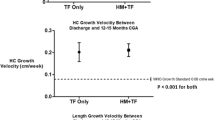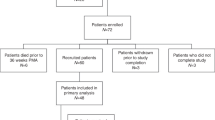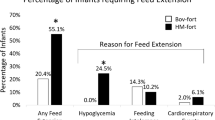Abstract
Objective
To compare the time to full enteral feeds in preterm infants fed exclusive human milk (EHM) - mother’s own milk (MOM) fortified with human milk-based fortifier (HMBF), to those who received partial human milk (PHM) - MOM fortified with bovine milk-based fortifier (BMBF), and exclusive formula.
Study design
A single-center retrospective study of infants with birth weight <1250 g from 2013 to 2018. Data on feeding, growth and other short-term neonatal morbidities were collected.
Results
On regression analysis, time to full enteral feeds was significantly higher in PHM compared to EHM group (β-coefficient 4.14, 95% CI 0.00–8.29) and formula-fed group compared to EHM (β-coefficient 4.3, 95% CI 0.32–8.20). No significant differences in growth velocity, length of stay and other morbidities were found between the groups.
Conclusion
Infants in EHM had better feeding tolerance and reached their enteral feed goals sooner compared to PHM and formula-fed groups.
This is a preview of subscription content, access via your institution
Access options
Subscribe to this journal
Receive 12 print issues and online access
$259.00 per year
only $21.58 per issue
Buy this article
- Purchase on Springer Link
- Instant access to full article PDF
Prices may be subject to local taxes which are calculated during checkout


Similar content being viewed by others
References
Agostoni C, Braegger C, Decsi T, Kolacek S, Koletzko B, et al. Breast-feeding: a commentary by the ESPGHAN Committee on nutrition. J Pediatr Gastroenterol Nutr. 2009;49:112–25.
Underwood MA. Human milk for the premature infant. Pediatr Clin North Am. 2013;60:189–207.
Dvorak B. Milk epidermal growth factor and gut protection. J Pediatr. 2010;156:S31–35.
Taylor SN, Basile LA, Ebeling M, Wagner CL. Intestinal permeability in preterm infants by feeding type: mother’s milk versus formula. Breastfeed Med. 2009;4:11–15.
Patel AL, Johnson TJ, Robin B, Bigger HR, Buchanan A, Christian E, et al. Influence of own mother’s milk on bronchopulmonary dysplasia and costs. Arch Dis Child Fetal Neonatal Ed. 2017;102:F256–F261.
Zhou J, Shukla VV, John D, Chen C. Human milk feeding as a protective factor for retinopathy of prematurity: a meta-analysis. Pediatrics. 2015;136:e1576–1586.
Nolan LS, Parks OB, Good M. A review of the immunomodulating components of maternal breast milk and protection against necrotizing enterocolitis. Nutrients. 2019;12:14.
Lechner BE, Vohr BR. Neurodevelopmental outcomes of preterm infants fed human milk: a systematic review. Clin Perinatol. 2017;44:69–83.
Vohr BR, Poindexter BB, Dusick AM, McKinley LT, Wright LL, Langer JC, et al. Beneficial effects of breast milk in the neonatal intensive care unit on the developmental outcome of extremely low birth weight infants at 18 months of age. Pediatrics. 2006;118:e115–123.
Section on Breastfeeding. Breastfeeding and the use of human milk. Pediatrics. 2012;129:e827–841.
Lager S, Powell TL. Regulation of nutrient transport across the placenta. J Pregnancy. 2012;2012:179827.
Tudehope DI. Human milk and the nutritional needs of preterm infants. J Pediatr. 2013;162:S17–25.
Schanler RJ. The use of human milk for premature infants. Pediatr Clin North Am. 2001;48:207–19.
Brown JV, Embleton ND, Harding JE, McGuire W. Multi-nutrient fortification of human milk for preterm infants. Cochrane Database Syst Rev. 2016;5:CD000343.
North K, Marx Delaney M, Bose C, Lee ACC, Vesel L, Adair L, et al. The effect of milk type and fortification on the growth of low-birthweight infants: An umbrella review of systematic reviews and meta-analyses. Matern Child Nutr. 2021;17:e13176.
Mimouni FB, Koletzko B. Human milk for preterm infants. Clin Perinatol. 2017;44:xix–xx.
Abrams SA, Schanler RJ, Lee ML, Rechtman DJ. Greater mortality and morbidity in extremely preterm infants fed a diet containing cow milk protein products. Breastfeed Med. 2014;9:281–5.
Cristofalo EA, Schanler RJ, Blanco CL, Sullivan S, Trawoeger R, Kiechl-Kohlendorfer U, et al. Randomized trial of exclusive human milk versus preterm formula diets in extremely premature infants. J Pediatr. 2013;163:1592–5. e1591
Ghandehari H, Lee ML, Rechtman DJ, Group HMS. An exclusive human milk-based diet in extremely premature infants reduces the probability of remaining on total parenteral nutrition: a reanalysis of the data. BMC Res Notes. 2012;5:188.
Bhatt D, Travers C, Patel RM, Shinnick J, Arps K, Keene S, et al. Predicting mortality or intestinal failure in infants with surgical necrotizing enterocolitis. J Pediatr. 2017;191:22–27. e23
Duro D, Kalish LA, Johnston P, Jaksic T, McCarthy M, Martin C, et al. Risk factors for intestinal failure in infants with necrotizing enterocolitis: a Glaser Pediatric Research Network study. J Pediatr. 2010;157:203–8. e201
Mol N, Zasada M, Kwinta P. Does type of feeding affect body composition in very low birth weight infants? - A prospective cohort study. Pediatr Neonatol. 2019;60:135–40.
Chou JH, Roumiantsev S, Singh R. PediTools electronic growth chart calculators: applications in clinical care, research, and quality improvement. J Med Internet Res. 2020;22:e16204.
Walsh MC, Kliegman RM. Necrotizing enterocolitis: treatment based on staging criteria. Pediatr Clin North Am. 1986;33:179–201.
Papile LA, Burstein J, Burstein R, Koffler H. Incidence and evolution of subependymal and intraventricular hemorrhage: a study of infants with birth weights less than 1,500 gm. J Pediatr. 1978;92:529–34.
Lucas A, Boscardin J, Abrams SA. Preterm infants fed cow’s milk-derived fortifier had adverse outcomes despite a base diet of only mother’s own milk. Breastfeed Med. 2020;15:297–303.
Sullivan S, Schanler RJ, Kim JH, Patel AL, Trawoger R, Kiechl-Kohlendorfer U, et al. An exclusively human milk-based diet is associated with a lower rate of necrotizing enterocolitis than a diet of human milk and bovine milk-based products. J Pediatr. 2010;156:562–7. e561
O’Connor DL, Kiss A, Tomlinson C, Bando N, Bayliss A, Campbell DM, et al. Nutrient enrichment of human milk with human and bovine milk-based fortifiers for infants born weighing <1250 g: a randomized clinical trial. Am J Clin Nutr. 2018;108:108–16.
Assad M, Elliott MJ, Abraham JH. Decreased cost and improved feeding tolerance in VLBW infants fed an exclusive human milk diet. J Perinatol. 2016;36:216–20.
Cregan MD, Fan Y, Appelbee A, Brown ML, Klopcic B, Koppen J, et al. Identification of nestin-positive putative mammary stem cells in human breastmilk. Cell Tissue Res. 2007;329:129–36.
Rogier EW, Frantz AL, Bruno ME, Wedlund L, Cohen DA, Stromberg AJ, et al. Lessons from mother: Long-term impact of antibodies in breast milk on the gut microbiota and intestinal immune system of breastfed offspring. Gut Microbes. 2014;5:663–8.
Roze JC, Darmaun D, Boquien CY, Flamant C, Picaud JC, Savagner C, et al. The apparent breastfeeding paradox in very preterm infants: relationship between breast feeding, early weight gain and neurodevelopment based on results from two cohorts, EPIPAGE and LIFT. BMJ Open. 2012;2:e000834.
Colaizy TT, Carlson S, Saftlas AF, Morriss FH Jr. Growth in VLBW infants fed predominantly fortified maternal and donor human milk diets: a retrospective cohort study. BMC Pediatr. 2012;12:124.
Author information
Authors and Affiliations
Contributions
HE was involved in writing the protocol, conducting the search and identifying eligible infants, extracting data and writing the manuscript. PV contributed to extracting data, interpreting results and reviewing the final manuscript. ML was involved in designing the study, extracting data and reviewing the manuscript. GN contributed to designing the study, interpreting results and reviewing the manuscript. RT helped with analyzing data and interpreting and writing the results. GB helped with extraction of data. MB was involved in designing and writing the protocol, analyzing data, interpreting results, creating reference list, and writing the manuscript.
Corresponding author
Ethics declarations
Competing interests
The authors declare no competing interests.
Additional information
Publisher’s note Springer Nature remains neutral with regard to jurisdictional claims in published maps and institutional affiliations.
Rights and permissions
About this article
Cite this article
El-Fadeel, H., Velumula, P., Lulic-Botica, M. et al. Effect of an exclusive human milk diet on feeding tolerance in preterm infants. J Perinatol 42, 1070–1075 (2022). https://doi.org/10.1038/s41372-022-01348-y
Received:
Revised:
Accepted:
Published:
Issue Date:
DOI: https://doi.org/10.1038/s41372-022-01348-y



